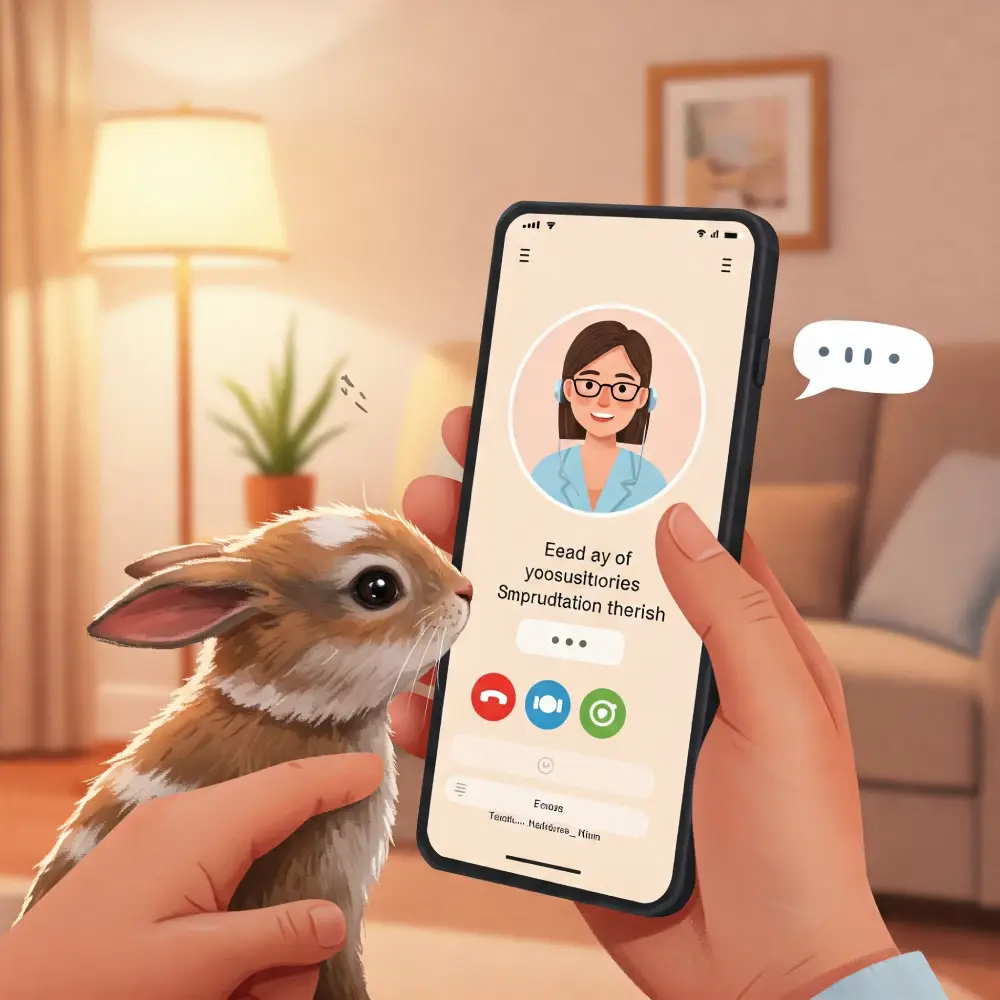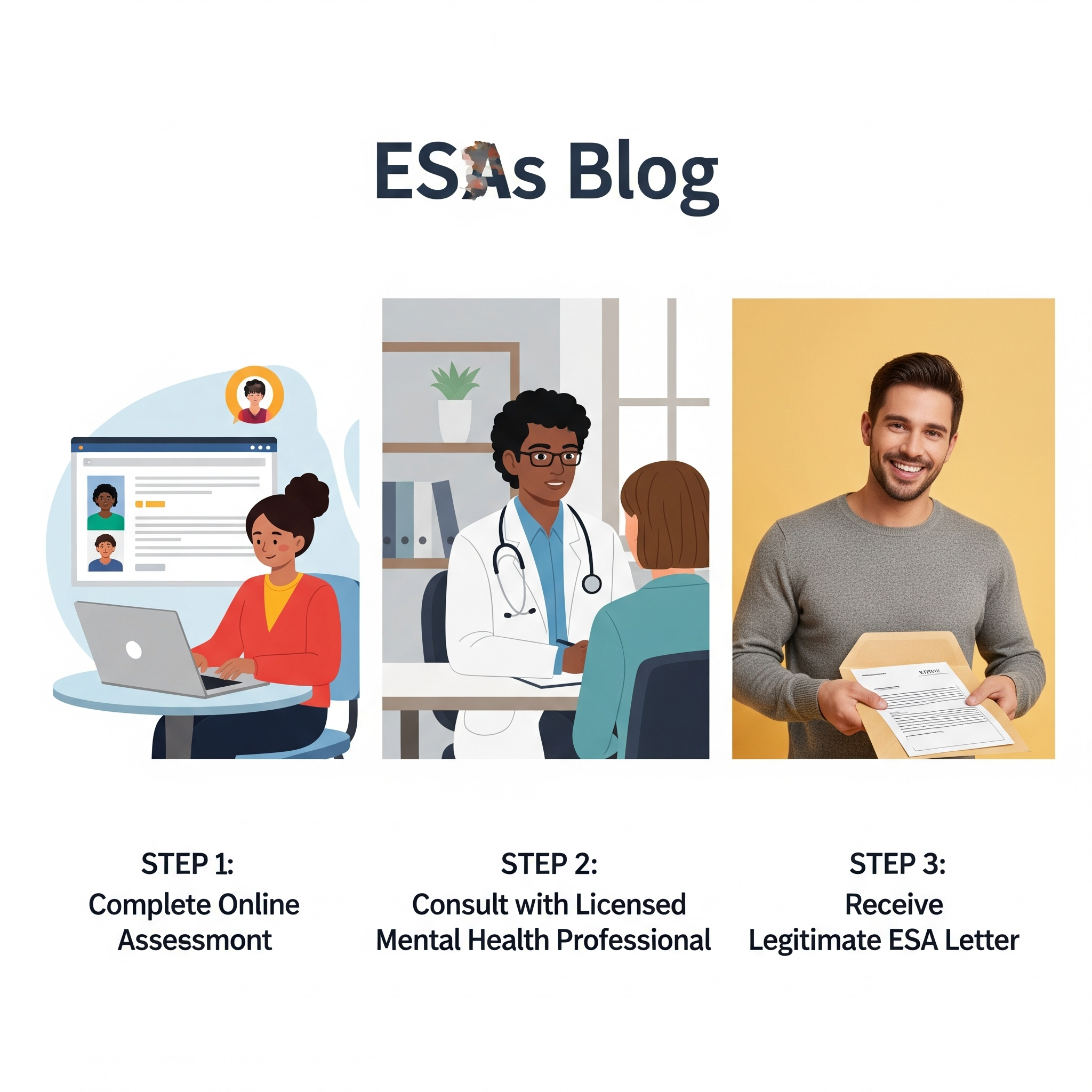Exploring the Unique Comfort of Small Animal Companions for Mental Health
When people think of Emotional Support Animals (ESAs), images of dogs and cats often come to mind. While canines and felines are indeed popular choices, the world of ESAs is far more diverse. For many individuals, smaller, less conventional companions like rabbits and guinea pigs can provide unique forms of comfort and support, proving to be excellent Emotional Support Animals.
At CertifyESA, we understand that the ideal ESA is one that genuinely mitigates the symptoms of a person’s mental health condition. We connect individuals with licensed mental health professionals who can assess their needs and provide legitimate ESA letters, regardless of the animal’s species, as long as it’s reasonable. This blog will delve into the specific attributes that make rabbits and guinea pigs suitable ESAs, exploring their benefits and considerations for those seeking comfort in a smaller package.
What Makes an Animal a Good ESA?
Before we look at specific species, it’s important to remember the core definition of an Emotional Support Animal under the Fair Housing Act (FHA). An ESA is an animal that provides comfort and emotional support that alleviates one or more symptoms or effects of a person’s mental or emotional disability (U.S. Department of Housing and Urban Development, 2020). The key is the therapeutic benefit the animal provides, not its species or specialized training.
The qualities that generally make an animal a good ESA include:
-
Ability to Form a Bond: The animal should be capable of forming a bond with its handler, offering companionship and a sense of connection.
-
Calming Presence: The animal’s presence should be generally calming and comforting, reducing anxiety or distress.
-
Manageable Demeanor: While not requiring specialized training, the animal should be generally well-behaved and manageable in a home environment.
-
Non-Disruptive: The animal’s presence should not create undue burden or disruption to the housing provider or other residents.
-
Species Appropriate for Housing: The animal should be able to be housed humanely and safely within typical residential settings.
Rabbits as Emotional Support Animals
Rabbits, often underestimated as companions, possess several characteristics that can make them exceptional ESAs for the right individual.
Benefits of Rabbits as ESAs:
-
Calm and Quiet Demeanor: Rabbits are generally quiet animals, making them ideal for apartment living where noise might be a concern. Their calm presence can be very soothing for individuals with anxiety or PTSD.
-
Affectionate and Social: While some might see them as aloof, well-socialized rabbits can be very affectionate. They enjoy being petted, sitting on laps, and even following their handlers around. The repetitive motion of petting a rabbit can be highly meditative and stress-reducing.
-
Predictable Routine: Rabbits thrive on routine, which can be beneficial for individuals who struggle with daily structure due due to depression or other conditions. Feeding times, playtime, and cage cleaning provide a sense of purpose and responsibility.
-
Cleanliness: Rabbits are naturally very clean animals. They can be litter-box trained, similar to cats, which makes them suitable for indoor living and easier to manage than some other small animals.
-
Gentle Nature: Their gentle nature can be particularly comforting for those who find the boisterousness of larger animals overwhelming. They provide a quiet, unassuming presence.
-
Compact Size: Their small size makes them adaptable to various living spaces, including apartments where space is limited.
Considerations for Rabbits as ESAs:
-
Fragility: Rabbits are delicate animals and require gentle handling. They are not suitable for individuals who may struggle with this due to physical limitations or who have young, boisterous children.
-
Chewing Instincts: Rabbits have a strong instinct to chew. Their living space and any areas they access must be thoroughly rabbit-proofed to protect wires, furniture, and ensure their safety.
-
Specific Dietary Needs: Rabbits require a diet primarily of hay, supplemented with fresh greens and a small amount of pellets. Understanding and adhering to their dietary needs is crucial for their health.
-
Lifespan: Rabbits can live 8-12 years or even longer, which is a significant long-term commitment.
Guinea Pigs as Emotional Support Animals
Guinea pigs, with their endearing vocalizations and gentle personalities, are another excellent, often overlooked, option for an ESA.
Benefits of Guinea Pigs as ESAs:
-
Highly Vocal and Responsive: Guinea pigs are known for their delightful “wheeking” sounds, especially when they hear their owner or anticipate food. This responsiveness can provide a sense of connection and reduce feelings of loneliness, as they actively “communicate” with their handler.
-
Gentle and Docile: Guinea pigs are typically very docile and rarely bite, making them safe and comforting for petting and holding. Their soft fur and warmth are very soothing.
-
Relatively Low Maintenance (Compared to Larger Animals): While requiring daily care, guinea pigs do not need walks or extensive outdoor exercise, fitting well into the lives of individuals with limited mobility or energy.
-
Sociable with Humans: Guinea pigs can form strong bonds with their handlers and enjoy interaction, often perching happily on laps for extended periods.
-
Easily Housed: They can be housed in spacious indoor cages, making them suitable for apartment living.
-
Sense of Routine and Purpose: Daily feeding, cleaning, and interaction provide a beneficial routine and a sense of responsibility, which can be very grounding for individuals struggling with mental health challenges.
Considerations for Guinea Pigs as ESAs:
-
Social Needs: Guinea pigs are highly social animals and often do best in pairs or groups. If kept alone, they require significant human interaction to prevent loneliness.
-
Cage Cleaning: Their cages require frequent cleaning to maintain hygiene and prevent odors, which can be a commitment.
-
Dietary Needs: They require a constant supply of hay, fresh vegetables (especially those high in Vitamin C, which they cannot produce themselves), and a small amount of pellets.
-
Lifespan: Guinea pigs typically live 5-7 years, which is a moderate commitment.
The ESA Letter: A Universal Requirement
Regardless of whether you choose a rabbit, guinea pig, dog, or cat, the most critical step in establishing your animal as a legitimate ESA is obtaining a proper ESA letter from a licensed mental health professional (LMHP).
At CertifyESA, we facilitate this crucial step. Our process involves connecting you with a qualified LMHP who will conduct a thorough assessment to determine:
-
If you have a qualifying mental or emotional disability: This is the foundational requirement under the Fair Housing Act.
-
If your animal provides a therapeutic benefit: The LMHP will determine how your specific animal (whether a rabbit, guinea pig, or other species) alleviates one or more symptoms of your disability.
-
If the accommodation is reasonable: While rabbits and guinea pigs are generally considered reasonable, the LMHP ensures the request aligns with FHA guidelines.
A legitimate ESA letter ensures that your housing provider is legally obligated to make a reasonable accommodation for your ESA, even in “no-pet” housing, and cannot charge pet fees or deposits (U.S. Department of Housing and Urban Development, 2020). Without this letter, your small companion, no matter how comforting, would be considered a pet under housing rules.
Making the Right Choice for You
The decision of what type of animal makes the best ESA is deeply personal. It depends on your specific mental health needs, living situation, lifestyle, and preferences.
-
Consider your symptoms: If quiet companionship and gentle interaction are paramount, a rabbit or guinea pig might be ideal. If you need more active engagement or public access, a dog might be more suitable.
-
Evaluate your living space: Rabbits and guinea pigs are excellent for smaller apartments or individuals who cannot provide outdoor access.
-
Assess your lifestyle and commitment: All animals require care, time, and financial resources. Ensure you can meet the specific needs of your chosen ESA for its entire lifespan.
-
Your previous experience: If you have prior experience and comfort with small animals, they may be a more natural fit for you.
Conclusion: Small Animals, Big Comfort
Rabbits and guinea pigs, with their unique combination of calm demeanor, affectionate nature, and manageable care requirements, can absolutely make wonderful Emotional Support Animals. For many individuals seeking gentle, non-judgmental companionship to navigate their mental health challenges, these small creatures offer significant therapeutic benefits.
At CertifyESA, we champion the recognition of all legitimate Emotional Support Animals. By ensuring you connect with a licensed mental health professional for a proper assessment and ESA letter, we empower you to secure the housing accommodations necessary to live comfortably with your cherished companion, no matter its size or species. If a rabbit or guinea pig is the right fit for your mental well-being, rest assured that their quiet presence can provide profound comfort and support.
APA Formatted Citations:
U.S. Department of Housing and Urban Development. (2020, January 28). Assessing a person’s request to have an animal as a reasonable accommodation under the Fair Housing Act. Retrieved from https://www.hud.gov/sites/dfiles/FHEO/documents/HUD_Guidance_on_ESA_01-28-2020.pdf





